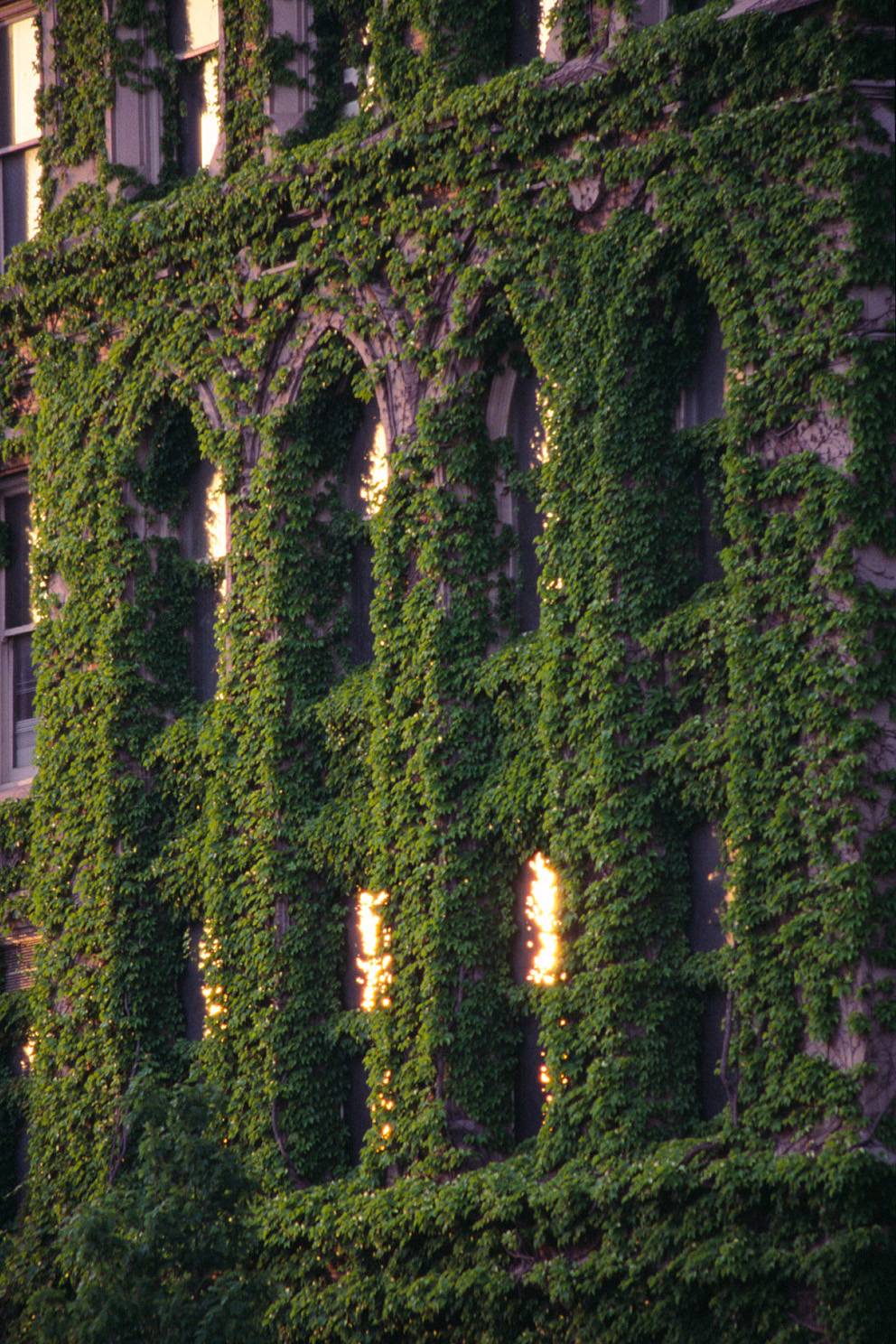 In picking a new Supreme Court Justice, President Obama must seek to diversify the group from which jurists are selected. From the earliest days of the civil rights movement, that’s meant steering away from the traditional course: the old boys’ network. But it’s become trickier — since women’s suffrage and black empowerment — to define an old boy.
In picking a new Supreme Court Justice, President Obama must seek to diversify the group from which jurists are selected. From the earliest days of the civil rights movement, that’s meant steering away from the traditional course: the old boys’ network. But it’s become trickier — since women’s suffrage and black empowerment — to define an old boy.
It’s harder to determine what’s diverse.
For older folks stuck in a 20th century paradigm of diversity, race and gender still seem adequate litmus tests for diversity. I can spot Blue Blood, though. The old boys’ network has a new face these days. It may be black or Hispanic. The old “boy” might be a woman. But the old boy’s CV hasn’t changed, s/he still has an Ivy League education.
It’s most problematic in the federal courts. Today’s federal judiciary bleeds Yale Blue, or Harvard Crimson.
The last time a non-Ivy was appointed to the Supreme Court, Wayne Williams was under suspicion for Atlanta’s child murders. Mark David Chapman was on trial for murder, too. Lady Diana Spencer prepared for her wedding day. The Centers for Disease Control puzzled over the case of 5 gay men in California, all suffering a rare form of pneumonia.
A month afterward, MTV was born.
That nominee was a graduate of Stanford Law, which would be Ivy but for East Coast Bias. In fact, the last justice not tainted by a private school education was Charles Whittaker, a chum of Harry Truman who graduated from the Kansas City School of Law. Whittaker cracked under the pressure of an inferiority complex, and resigned his seat after five years. Maybe that’s when the preference for the aristocracy started.
Of the current court, only John Paul Stevens (Northwestern) is not a graduate of Harvard or Yale. It’s hard to determine the kinds of biases shared by an insular group who sat in the same rooms, ate in the same cafeterias, and learned from the same handful of professors. But you can start with “limited worldview.”
Enough.
Political progressives must put a stop to the private school dominance in government, and policy-making. A left-leaning coalition of activist groups spent a century getting public schools funded, and accessible to all. If the products of public schools don’t have access to the highest echelons of intellectual achievement (and paycheck), the battle was fought for nothing much. As it stands, a public education ensures diminished employment prospects. There’s no greater indictment of the public schools system.
The public school litmus test bars not just the Ivies, but also graduates of Williams and Andover. Let’s hope they can find jobs.
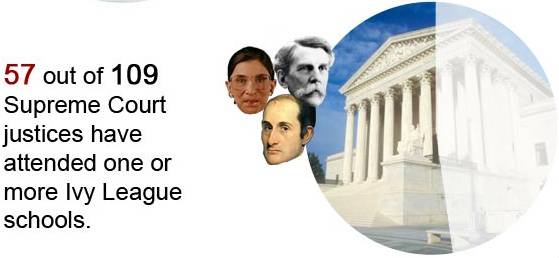
This lack of diverse backgrounds is a common talking point. There’s a bias favoring experience as a federal appellate judge. Sherrilynn Ifill writes “the truth is that some of the most thoughtful, distinguished lawyers in the profession are in the fields of criminal defense and civil trial practice. Legal academia is likewise a source of tremendously talented lawyers.”
Her viewpoint admits her own fields of experience: It’s still limited to law talkin’ guys. Timothy O’Neill and Arlen Specter admonish President Obama to look beyond the federal bench, and Specter specifically recommends Obama look outside the legal community.
There’s no requirement that a supreme court justice be a lawyer. Trial court judges must have a firm, immediate grasp of procedure and the Federal Rules of Evidence. Appellate judges need none of that. An understanding of American Constitutional history will save the nominee a lot of time, and make it easier at confirmation hearings. But that understanding could be evinced from the mouths of journalists, political science professors, or an eccentric billionaire. (Or, I should add, a guitar-playing sportswriter.)
It’s vital that the nominee understand stare decisis, whether she believes in a living document, or originalism. Above all, it’s important that the nominee be smart.
But there’s an ongoing awareness about the lack of real life experience among the judiciary. It mostly gives lip service to the idea that jurists should be well-rounded. For example, in 2005 the press made a big deal of Chief Justice John Roberts’ working class roots. His dad “worked at a steel factory,” we were told. Well, there’s a big difference between working at a steel factory and being put through private schools by someone who worked at a steel factory. (From La Lumiere through Harvard, Justice Roberts never set foot in a public school.) Moreover, Roberts Sr. was management, not labor.
THE USUAL SUSPECTS
The anti-Ivy litmus test makes picking a new justice easy. Almost all of the frequently named candidates are wiped off the board. They may have brains and compelling stories, but Harold Koh is a Harvard boy. So is Kathleen Sullivan. Same with Cass Sunstein. And Deval Patrick. Elena Kagan and Jennifer Granholm did Harvard Law, too.
Sorry guys. You’re out.
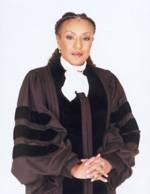 Leah Ward Sears attended Emory Law School. But she did undergrad at Cornell. It’s Ivy. (And arguably, it’s the Ivy undergrad education that should be most scrutinized. All law schools are full of arrogant pricks.) She’s friends with Clarence Thomas and writes about preserving traditional families. She may represent the new black majority in being shockingly (to the white kids who marched in the freedom rallies) conservative about gayness and abortion. With a filibuster-proof senate, Obama will not be looking for a Republican-appeasing nominee.
Leah Ward Sears attended Emory Law School. But she did undergrad at Cornell. It’s Ivy. (And arguably, it’s the Ivy undergrad education that should be most scrutinized. All law schools are full of arrogant pricks.) She’s friends with Clarence Thomas and writes about preserving traditional families. She may represent the new black majority in being shockingly (to the white kids who marched in the freedom rallies) conservative about gayness and abortion. With a filibuster-proof senate, Obama will not be looking for a Republican-appeasing nominee.
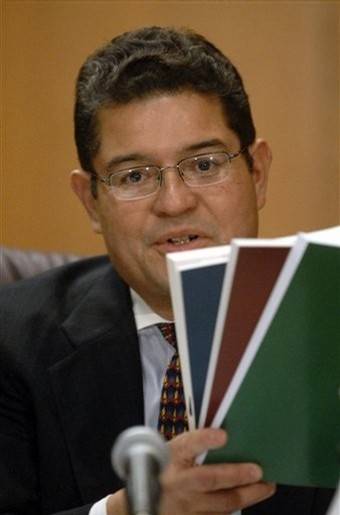 Ruben Castillo went to Northwestern. Not Ivy, but not un-Ivy enough.
Ruben Castillo went to Northwestern. Not Ivy, but not un-Ivy enough.
The presumptive favorite is Sonia Sotomayor. She might be an apt replacement for Justice Souter, in that her place on the liberal-conservative spectrum seems murky. But Sotomayor has two problems. She’s Ivy, and she’s Catholic. The Supreme Court already has a Catholic majority. That’s stunning, and disquieting. Sotomayor would give the Vatican a two-thirds majority.
In fact, a lot of Hispanics will have this problem. They can’t help it that the conquistadors brought religion. But until they renounce it, we should (respect? accuse?) their tradition, and then not give them jobs, because of it.
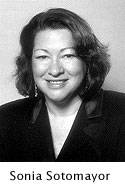 The ethnic and religious make-up of the court has been a consideration since Louis Brandeis captured the Jewish Seat. Clarence Thomas made the black seat even blacker, and has done an excellent job of demonstrating that you can be black without puppeting “the black issues.” By the same token, polls suggest most American Catholics aren’t patsies for Vatican policies. But five is plenty, for whatever purposes. Let’s not pretend that a person’s background is not important.
The ethnic and religious make-up of the court has been a consideration since Louis Brandeis captured the Jewish Seat. Clarence Thomas made the black seat even blacker, and has done an excellent job of demonstrating that you can be black without puppeting “the black issues.” By the same token, polls suggest most American Catholics aren’t patsies for Vatican policies. But five is plenty, for whatever purposes. Let’s not pretend that a person’s background is not important.
That leaves Diane Wood. She’s white, and she’s not gay. But at least she has a vagina instead of a penis. And most importantly, she earned both her degrees at the University of Texas. Austin still cares about drinking and music. I approve. But I’d also join Senator Specter in preferring a non-jurist.
SO WHO THEN?
I don’t think it’s necessary that President Obama find a homeless person for the job. But I would like to see someone who’s the antithesis of Chief Justice Roberts. Common wisdom holds that it won’t be a white man. I add “Catholic” to the list of disqualifiers. But most importantly: No private schools. From Kindergarten through terminal degree, I want it all public.
I like Alex Kozinski, who went to UCLA. But he’s got an appellate judicial experience problem, as well as a white man problem. Other white men I’d nominate would be libertarian potheads O’Rourke and Maher, who also have Catholic problems. And Maher went to Cornell, so fuck that.
A blisteringly intelligent lesbian atheist of color would be good, for diversity purposes. But little is known about Wanda Sykes’s view of religion. Ayaan Hirsi Ali and Irshad Manji would raise the intelligence level in chambers. They would blow the life experience quotient out of the water. Neither is an American, but that’s not required for justices, either. (Really.)
I guess I recommend either of those two. They also suit my last qualifying characteristic: I think it would be nice if the person were not a Washington regular.
One of David Souter’s best qualities was being a Washington outsider. (Watch CBS Newsman Bob Schieffer rake Souter over the coals about it, here.) I have lived and worked in the industry town of Washington. I have lived and worked in the industry town of Los Angeles. I find few differences. The end product of one is overproduced government. The other gives us overproduced entertainment.
Fresh perspectives come from outside.








